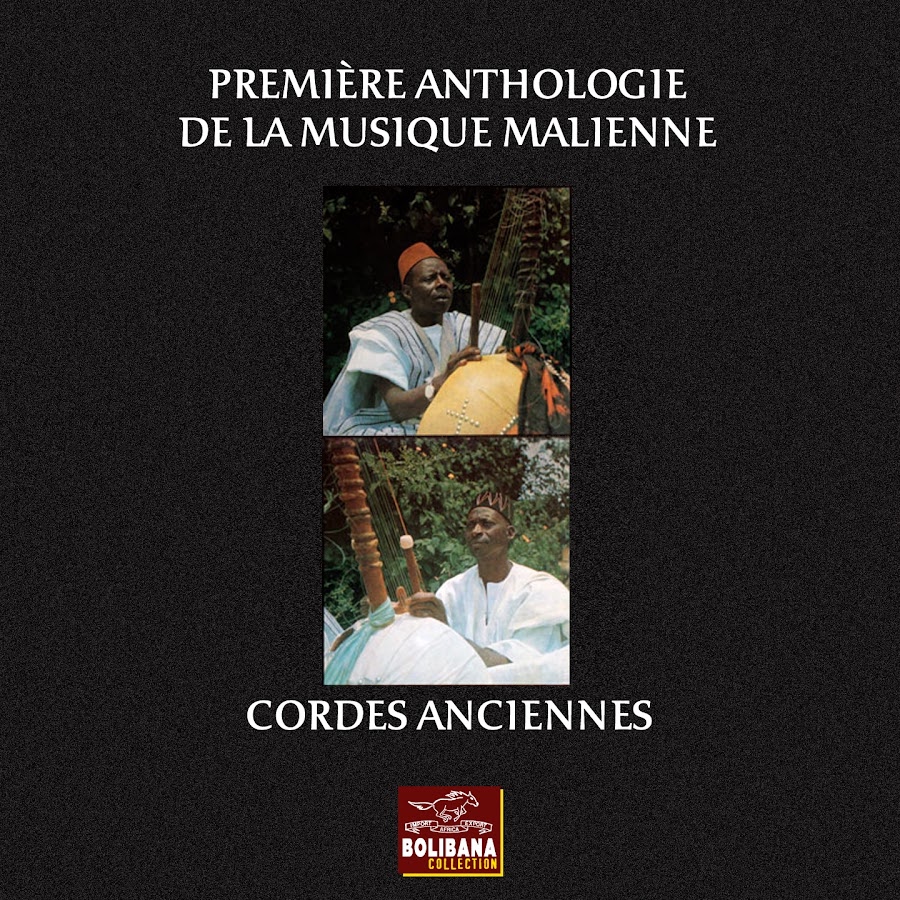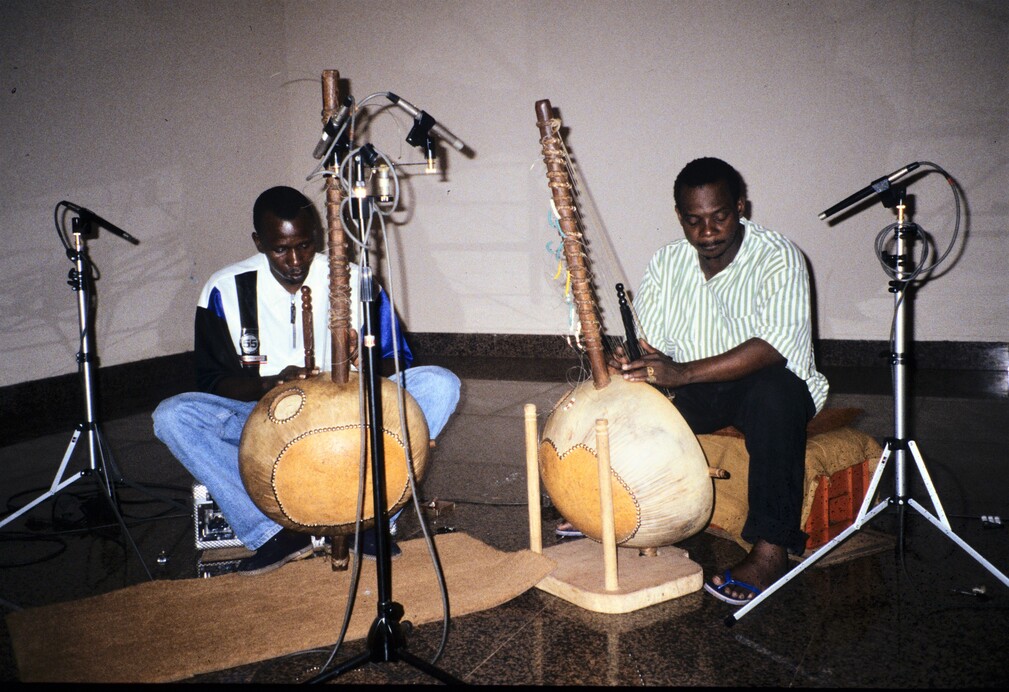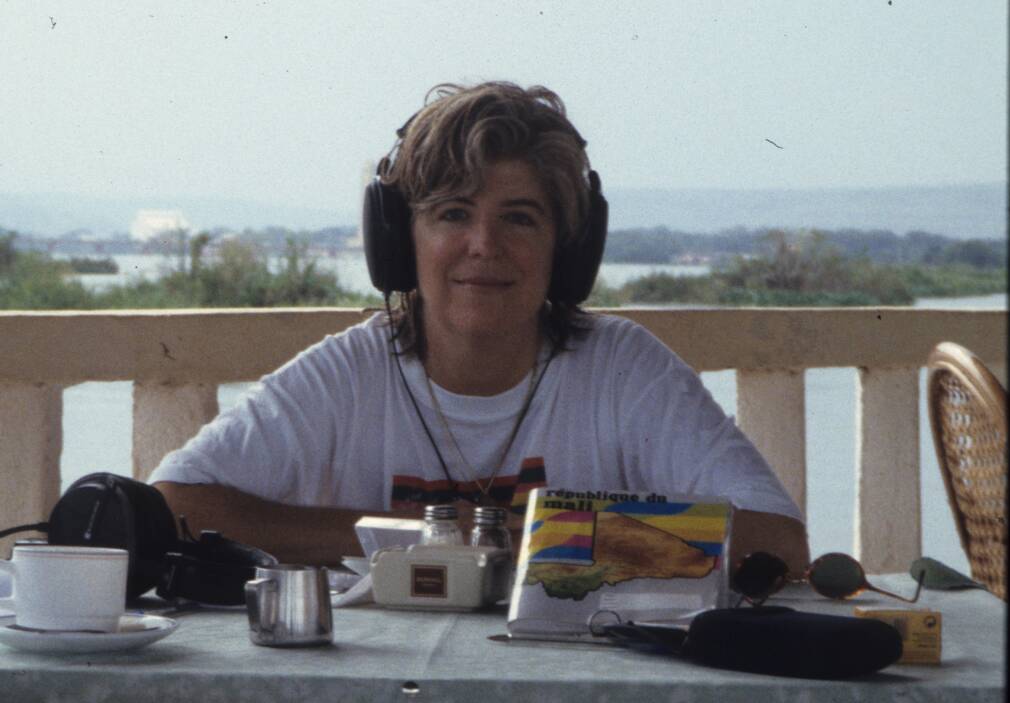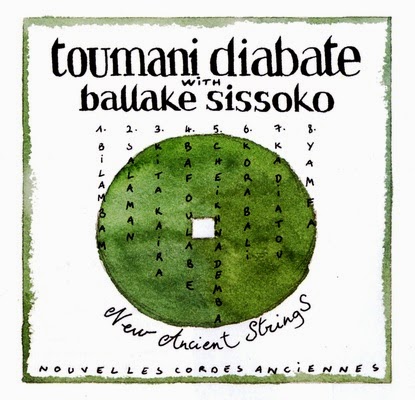“Well let me tell you how it all happened” begins Lucy Durán. It’s spring in London and the renowned record producer and professor is remembering a night in Bamako in September 1997. We’re here to speak about New Ancient Strings, a timeless album of kora duets by Toumani Diabaté and Ballaké Sissoko and perhaps Lucy’s favourite of the twenty five records she has produced. Recorded in a single night on September 22nd 1997 this classic long player has long been out of print, only adding to its cult status among audiophiles and connoisseurs of Mandé music. Now slated for reissue on Chrysalis Records, this gem which takes its name from the 1970 recording Cordes Anciennes by the duo’s fathers, is soon to be available again in all its high fidelity.

Lucy (who picks up her kora during our chat to explain a point of tuning) began her association with the twenty one string West African harp with the Gambian master Amadu Bansang Jobarteh, and had known Toumani for more than a decade when they began discussing a follow up to his father’s album with Djelimadi Sissoko. “Initially, I wanted to do the album with Toumani’s father Sidiki Diabaté,” she explains. “I wanted it to be a father and son duet. They were very very competitive, which is a very Malian thing. It’s called `fadeya’ meaning rivalry between children of the same father with different mothers. So your first rival in life is always your father.”
Having produced the younger Diabaté’s 1988 debut Kaira she put the idea to Sidiki who liked it. “I think he thought he would be able to outplay his son, and of course his son probably thought he’d be able to outplay his dad!” she chuckles. With father and son on board, she set about persuading a label. “I was trying to convince Joe Boyd of Hannibal Records. We’d done four albums at that point (with no money!) and I was trying to persuade him to go for this idea for a New Ancient Strings following on from Ancient Strings. I liked the play on ‘new’ and ‘ancient’,” Lucy laughs, before reaching the sad part of the story. “So Sidiki went to Gambia in April 1996. He was born in The Gambia and he went to his birth town which is called Bansang where he suffered some kind of a stroke and died during early morning prayer. He was repatriated to Mali (even though he wasn’t really originally Malian) and given a state funeral. At this point Joe Boyd had said, ‘let’s do it!’ and then suddenly, we’d lost Sidiki.” Realising the need to change the narrative, Lucy decided to ask Ballaké Sissoko if he would step in for Sidiki, flipping the script to two sons reprising their father’s music. “Ballaké and Toumani’s fathers were great friends,” she reasons. “They knew each other in Gambia and both emigrated to Mali and joined the Mali National Ensemble. So it made good sense for the sons of these two great friends who lived side by side in Bamako (the two families were given one piece of land by the president which they divided between themselves) to do it.”
Recruiting classical music recordist Nick Parker and hiring a Nagra reel to reel tape machine, Lucy flew to Bamako and began scouting for a recording location. “We visited a lot of studios! Including Salif Keita’s studio, and we were like, they’re fine for some things, but not this project. We went outside Bamako too and visited all kinds of locations that might have had good acoustics. And it was like, ‘No, no, no, no.’” And so it went on before finally someone suggested the newly completed Palais de Congrès. “There, we found in between two big halls, a corridor, a kind of vestibule.” Lucy explains. Unusual for Mali, the walls of this chamber were extremely thick, meaning zero outside noise pollution. “The floors were marble, and the walls were marble. It just had a lovely natural reverb so Nick said ‘We’re going to do it here!’ They said, ‘You can have it, but only after 10pm because during the day we have a lot of activities and government meetings.’ So finally on day seven, after looking at dozens of different places we went there at 10pm.”
Placing Toumani and Ballaké in the centre of the room, Nick set up four microphones and the group were ready to go. Well, almost… “We started, and we realised there was a cricket in the air con! It was screeching away, so we spent at least an hour trying to chase it down. Finally we managed it and we were just in complete giggles and hysterics. So these two young men settled down on the anniversary of Mali’s independence, which was just a marvellous coincidence and not intentional!” and recording began. Two very complimentary players with Ballaké bringing an “incredible sense of rhythm” and Toumani, “melody and virtuosity”, most of the tunes were done in two takes with recording beginning at midnight and ending at around seven in the morning.

photo and © Lucy Duran
The album begins with “Bi Lambam” a composition dating back to the 13th century and a traditional dance of the jeli (the artisanal lineage of bards, historians and mediators to which Ballaké and Toumani belong) on which the two musicians take flight with trills and flourishes. The seven duets that follow each reinterpret a tune from the encyclopaedic jeli repertoire, be it an allegory such as “Bafoulabe” based on “Mali Sajio” which laments the killing of a hippopotamus (Mali’s totemic animal) or the praise song “Cheikhna Demba.” “It’s a story about the son of the ruler of Segou who should have inherited the throne” Lucy contextualises, “but instead he was exiled and banished to a village that was 10 kilometres from the Niger River and had no water. And the story goes that the griots would go to him (and this is typical griot behaviour) and say ‘You smell! and your wives stink. What’s the matter? Don’t you wash?’ To which he replied ‘We don’t have any water’ and they said ‘Well do something about it!’ So he had a canal dug from the Niger River, all the way to the village, and that’s what the song is about!” With its pentatonic pyrotechnics and the crystal reverb of the Palais de Congrès, this tune was broadcasted daily as theme music by Mali’s national broadcaster, The Office of Radio and Television of Mali (ORTM) for many years.
Another jeli standard is reimagined as “Yamfa.” Based on the traditional “Alla l’aa ke” (to forgive) on which Djelimadi and Sidiki dueted for Cordes Anciennes, New Ancient Strings sees their sons revisit the piece with their own flavour. Notable is the modern technique Ballaké and Toumani bring to their ancient strings such as percussively dampening notes in contrast to their fathers’ very open kora sound. Likewise the dizzying runs and sparring (which Lucy says she shamelessly encouraged once she discovered the two “were very competitive”) that characterises the album. And so as another day began in Bamako the session concluded with Lucy realising, “We had something very special.”

Returning to the UK with the tapes, Lucy and Nick added very little, instead the challenge was to edit down so much playing onto one album. Eventually released on June 22nd 1999, the album was met with rave reviews which Lucy describes as: “Very gratifying, because it’s not an obvious commercial album.” Reflecting on the `If you know, you know’ currency of New Ancient Strings she says “I think anyone who’s interested in the kora will have heard and been amazed by it, the album has had a life of its own.” Indeed, former Malian president Amadou Toumani Touré was known to gift a copy to important guests and dignitaries, a nice continuation of the jeli’s association with diplomacy.
Soon available to gift and share once again, New Ancient Strings is as remarkable for its acoustics as the virtuosity of the two featured maestros who would go on to become international stars.“There’s a magic to it” Lucy concludes, adding, “It’s the least produced album of anything I’ve done and yet maybe for that reason, it’s possibly the best!” Before signing off with, “It’s an album that will not date… An album that people are always going to appreciate.”





